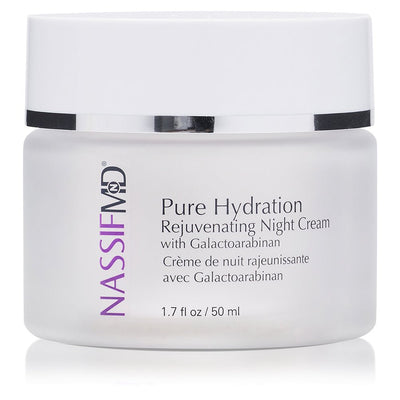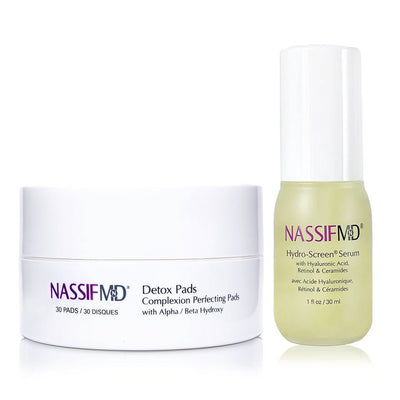What Are Face Serums and Do You Need to Add Them to Your Skincare Routine?
Do you need serum in your skincare routine? Yes! Adding a serum to your day is something simple you can do right away to protect and restore skin health now and into the future.
Face serums are light, concentrated formulas that target specific skin issues, such as aging, loss of firmness, fine lines, and more. If you aren’t yet using a face serum in your skincare routine, this article will open a world of options for younger, brighter, and more hydrated skin.
Keep reading to learn all the details about face serums, including:
- What is a face serum?
- Types of face serums
- Day serums vs. night serums
- Where does serum go in the skincare routine?
- How to use a face serum
- Can you use multiple serums on your face?
- The best face serums from NassifMD®
Let’s dive into everything you need to know about face serums!
What is a Face Serum?
Face serums are topical skincare products with a potent dose of one or more active ingredients. They create light coverage and absorb quickly; you only need a small amount.
Face serums target various skin issues, such as dullness, fine lines, acne, and changes in pigmentation. Often, they are soothing and serve to nourish, protect, and hydrate the skin, and can be water or oil-based.
Types of Face Serums
Face serums differ based on their active ingredient (or ingredients) and their primary action on the skin. Depending on the formula, they can be firming, hydrating, brightening, exfoliating, anti-aging, or more than one.
Firming
Firming serums target sagging skin and work to reduce the appearance of fine lines and wrinkles. One way to do this is to use active ingredients that promote collagen production and counter the collagen loss with age.
You’ll often find retinol in firming products. Retinol is an active form of vitamin A essential for skin health. Retinol provides antioxidant protection, maintains healthy barrier function, prevents collagen loss, and supports hydration. All these actions help reduce wrinkles. Retinol is the first FDA-approved wrinkle reducer, helping to firm skin.
A 2020 study of retinol serums found topical application of retinol safe and promotes even skin color, overall skin tone, skin elasticity, moisture, and reduced signs of aging. Bakuchiol is a retinol-like compound and may be better tolerated by those with sensitive skin.
Niacinamide is another active ingredient you may find in firming serums. Niacinamide is a form of vitamin B3. Topically, it provides antioxidant protection, supports energy production in skin cells, firms, hydrates, and improves fine lines.
Hydrating
Hydrating serums almost always contain hyaluronic acid, an essential molecule in the body that decreases with age. Hyaluronic acid draws water into the skin and holds onto it. The result is plumper, younger-looking skin with diminished fine lines and wrinkles.
A 2022 study of a hyaluronic acid serum found both short- and long-term hydrating benefits verified by skin biopsies. This finding is important finding since skin aging is associated losing hydration.
To learn more about how to hydrate your skin and the difference between hydrating and moisturizing, please read A Facial Plastic Surgeon Explains How to Hydrate Your Skin for a Youthful, Healthy Appearance.
Brightening
Brightening serums even the skin pigmentation reducing and preventing dark spots (hyperpigmentation). Vitamin C is the active ingredient most often used in brightening formulas.
Vitamin C is a potent antioxidant, naturally found in high concentrations in the skin. It protects the skin by fighting free radicals from UV radiation and toxins. Vitamin C inhibits melanin, the skin pigment associated with sunburn, tanning, and aging, while promoting collagen production for firmer, younger skin.
Vitamin C serum is safe and highly effective for brightening and reducing the signs of aging. One study found vitamin C significantly reduced hyperpigmentation, roughness, and fine lines.
To learn more about the differences between vitamin C and retinol serums and how to incorporate them into your skincare routine, please read The Latest Skincare Ingredient Debate: Should I Use Vitamin C or Retinol? Or Both?
Exfoliating
While facial scrubs offer physical exfoliation, exfoliating serums contain a gentle chemical exfoliant such as alpha or beta hydroxy acids (AHA and BHA).
Glycolic acid is an example of an alpha hydroxy acid that occurs naturally in plants. It helps remove dead skin cells, unclog pores, prevent acne, and brighten dull skin.
Read more about gentle chemical exfoliation in Why Detox Pads Should Be a Staple in Everyone’s Skincare Routine.
Anti-Aging
Anti-aging serums may also address many of the issues discussed above and include active ingredients such as antioxidants, vitamin C, retinol, bakuchiol, niacinamide, hyaluronic acid, and more. In fact, all serums with these ingredients are considered anti-aging.
Day Serums Vs. Night Serums
You can experiment with your serums during the day, at night, or both to find what works best for you. In general, however, using protecting, antioxidant-rich products during the day (such as a vitamin c serum) and rejuvenating, anti-aging products at night (such as a retinol serum) is recommended. Hydrating serums that include hyaluronic acid can be used twice per day.
Where Does Serum Go in a Skincare Routine?
When considering the steps in your skincare routine, adding a serum is easy. Apply a serum after cleansing to a clean face and then seal it in with a moisturizer before applying any sunscreen or makeup.
How to Use a Face Serum
Serums feel light on the skin and absorb quickly. Apply them twice per day, morning and night, after cleansing your face. Follow with the rest of your skincare routine.
Can You Use Multiple Serums at the Same Time?
Serums lend themselves well to layering, so you can use more than one. Start slow, incorporating one at a time. You may want to begin with a new serum a few times per week and then work up to daily use if you have sensitive skin.
The Best Face Serums to Add to Your Routine Right Now
The NassifMD® Serum Collection has many choices to meet your skin health goals. Here are some of our most-loved serum options:
- Best everyday antioxidant + anti-aging serum: NassifMD® Daily Revitalizing Antioxidant Serum with Antioxidant Complex to Prevent Signs of Aging is a gentle, lightweight, revitalizing serum for all skin types. It contains vitamin C, ectoin, niacinamide, and mineral salts.
- Best antioxidant + anti-aging serum for nighttime use: NassifMD® Nightly Restorative Antioxidant Serum with Antioxidant Complex to Prevent Signs of Aging contains Persian silk tree extract, melatonin, vitamin C, vitamin A, vitamin E, and more to rejuvenate the skin overnight to combat the aging effects caused by environmental factors.
- Best serum for hydrating and protecting during the day: NassifMDâ Dermaflect Smart Day Therapy Serum Daily Anti-Aging Therapy features vitamin C, hyaluronic acid, and reflective minerals to restore skin while in the sun.
- Best nourishing serum + makeup primer: NassifMD® Hydro-Gel Serum Mattifying Serum with Hyaluronic Acid and Retinol is both an anti-aging, hydrating serum and a makeup primer. Use it as the last step before makeup.
- Best nighttime therapeutic serum: NassifMD® Night Therapy Serum Nighttime Anti-Aging Therapy with Vitamin C & Retinol is an innovative formula containing vitamin C and retinol to reduce the signs of aging, brighten, and plump skin overnight.
- Best quick-fix for wrinkles: NassifMD® Quickfix Instant Wrinkle Smoother instantly blurs fine lines, wrinkles, and undereye bags with concentrated hyaluronic acid, glycoin, and other synergistic ingredients. Use this as a quick, layering spot treatment for instant wrinkle smoothing. It doesn’t need to be applied dover the whole face.
- Best vitamin C serum for layering with other serums: NassifMD® Radiance Brightening Booster contains a potent vitamin C and vitamin F complex to reverse aging, age spots, and sun damage while brightening and protecting the skin.
- Best-selling and best overall serum: NassifMD® Hydro-Screen Serum. If you are going to use just one serum, this is it! This formula hydrates, moisturizes, repairs, and restores with a synergy of active ingredients, including hyaluronic acid, ceramides, retinol, and more.
If you need more guidance, use our virtual skincare consultation tool to discover the best products for you.
Serums are potent, effective formulas with multiple anti-aging benefits to firm, brighten, hydrate, and nourish the skin. Try a serum today and see the difference!
References
- Zasada, M., & Budzisz, E. (2019). Retinoids: active molecules influencing skin structure formation in cosmetic and dermatological treatments.Postepy dermatologii i alergologii, 36(4), 392–397.
- Zasada, M., Budzisz, E., & Erkiert-Polguj, A. (2020). A Clinical Anti-Ageing Comparative Study of 0.3 and 0.5% Retinol Serums: A Clinically Controlled Trial.Skin pharmacology and physiology, 33(2), 102–116.
- Dhaliwal, S., Rybak, I., Ellis, S. R., Notay, M., Trivedi, M., Burney, W., Vaughn, A. R., Nguyen, M., Reiter, P., Bosanac, S., Yan, H., Foolad, N., & Sivamani, R. K. (2019). Prospective, randomized, double-blind assessment of topical bakuchiol and retinol for facial photoageing.The British journal of dermatology, 180(2), 289–296.
- Gehring W. (2004). Nicotinic acid/niacinamide and the skin.Journal of cosmetic dermatology, 3(2), 88–93.
- Robinson, D. M., Vega, J., Palm, M. D., Bell, M., Widgerow, A. D., & Giannini, A. (2022). Multicenter evaluation of a topical hyaluronic acid serum.Journal of cosmetic dermatology, 21(9), 3848–3858.
- Pullar, J. M., Carr, A. C., & Vissers, M. C. M. (2017). The Roles of Vitamin C in Skin Health.Nutrients, 9(8), 866.
- Xu, T. H., Chen, J. Z., Li, Y. H., Wu, Y., Luo, Y. J., Gao, X. H., & Chen, H. D. (2012). Split-face study of topical 23.8% L-ascorbic acid serum in treating photo-aged skin.Journal of drugs in dermatology : JDD, 11(1), 51–56.
- Valle-González, E. R., Jackman, J. A., Yoon, B. K., Mokrzecka, N., & Cho, N. J. (2020). pH-Dependent Antibacterial Activity of Glycolic Acid: Implications for Anti-Acne Formulations.Scientific reports, 10(1), 7491.






















